
Jay Hovdey’s unmissable series continues with the horse who spoiled Cigar’s farewell party in the Breeders’ Cup Classic
 Alphabet Soup didn’t have to be a star. If you’d have asked him, and he’d been able to answer, maybe he didn’t even want to be a star. There was no particular destiny attached to his lineage, no heightened expectations based on purchase price.
Alphabet Soup didn’t have to be a star. If you’d have asked him, and he’d been able to answer, maybe he didn’t even want to be a star. There was no particular destiny attached to his lineage, no heightened expectations based on purchase price.
Given a choice, he might have been content at any number of jobs. It seemed for him, being simply a domesticated member of the sub-species Equus ferus caballus was its own reward.
Then again, he was in many ways the perfect template upon which the Thoroughbred sport should be built – built upon a horse of unquestioned integrity, able to deal with inevitable setbacks, and cared for by people who recognized the developing rhythms of the talent in their midst.
From the outset, Alphabet Soup was referred to as a “work in progress” whose journey eventually led to the very pinnacle of the game.
In time, he also became a celebrity, for as much as he represented off the track as on. His racing career spanned two dozen races across three campaigns. For 18 years he was a reliable stallion, never straying from North America.
In retirement, he became a popular attraction among aging superstars at Old Friends Equine in Kentucky, where pilgrims would convene to feed ‘Alphy’ carrots and linger at his fence line.
“He was the consummate pro, very classy, but never a ‘wow’ horse,” said Grant Hofmans, son of Alphabet Soup’s trainer, David Hofmans. “He’d just go out and do his job, then come back to the barn.”
Those barns were located at Hollywood Park, Santa Anita, and Del Mar, where Alphabet Soup made all but one of his 24 starts. Over time, his ever-bleaching coat became a familiar signal that all was well in the ranks of older horses, and that soon there would be another memorable helping of Alphabet Soup.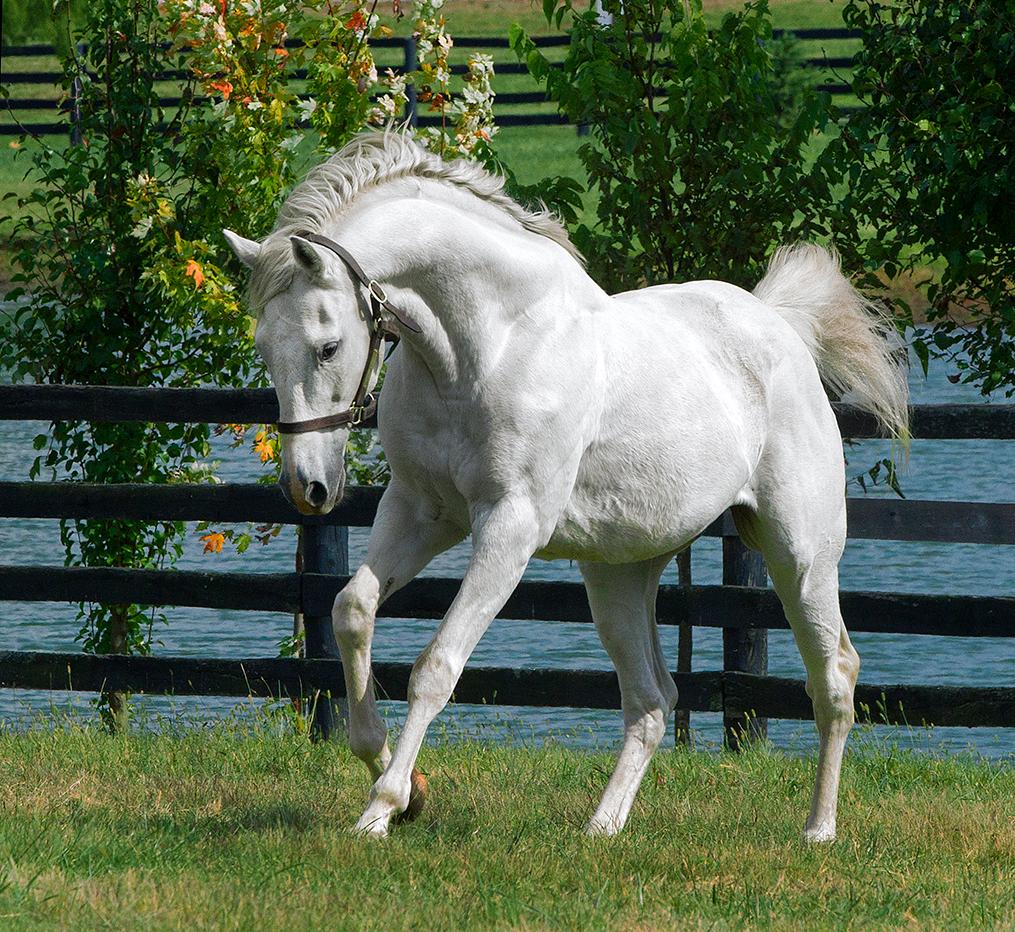
Tossed salad
A search of his family reveals a tossed salad of European and American influences, featuring a five-generation outcross.
The female side traces to Chellandry, England’s best two-year-old of 1896 and winner of the 1897 running of the 1,000 Guineas. The daughter of Goldfinch went on to become one of the cherished broodmares of the age, producing five stakes-winners from her first eight foals. Foremost among them was Neil Gow, a superior two-year-old who went on to win the Craven, 2,000 Guineas and Eclipse of 1910.
Bloodstock historian Liz Martiniak praises Chellandry as “one of those rare individuals which Thoroughbred breeders and owners pray for, but very rarely possess.
“The racetrack deeds of her offspring paled in comparison to what several of them accomplished in the breeding ranks, [including] Gay Bird, by Gay Crusader, who was Classics-placed,” Martiniak wrote in her Thoroughbred Heritage portrait of Chellandry.
“Several major American stakes winners trace in the female line to Gay Bird, notably Clem, Quick Call, Header Card, Illiterate, and Alphabet Soup.”
There is a leap of four generations from Gay Bird to Illiterate, a daughter of Arts And Letters, from the first crop of that 1969 US Horse of the Year, in 1972.
She was bred by Willis E. Kuhn's Cotton Patch and later acquired by the Tartan Farm of William McKnight, under the supervision of his farm manager, Hall of Fame trainer John Nerud. Trained by Nerud’s son, Jan Nerud, Illiterate was a busy mare, racing 67 times and winning 10, including a pair of G3 events in New York.
Illiterate produced four foals for Tartan, all winners, before she was sold in late 1985 in-foal to Northern Jove for $150,000 to Thomas P. Whitney. Two years later, she was back on the auction block, in foal to Dixieland Band.
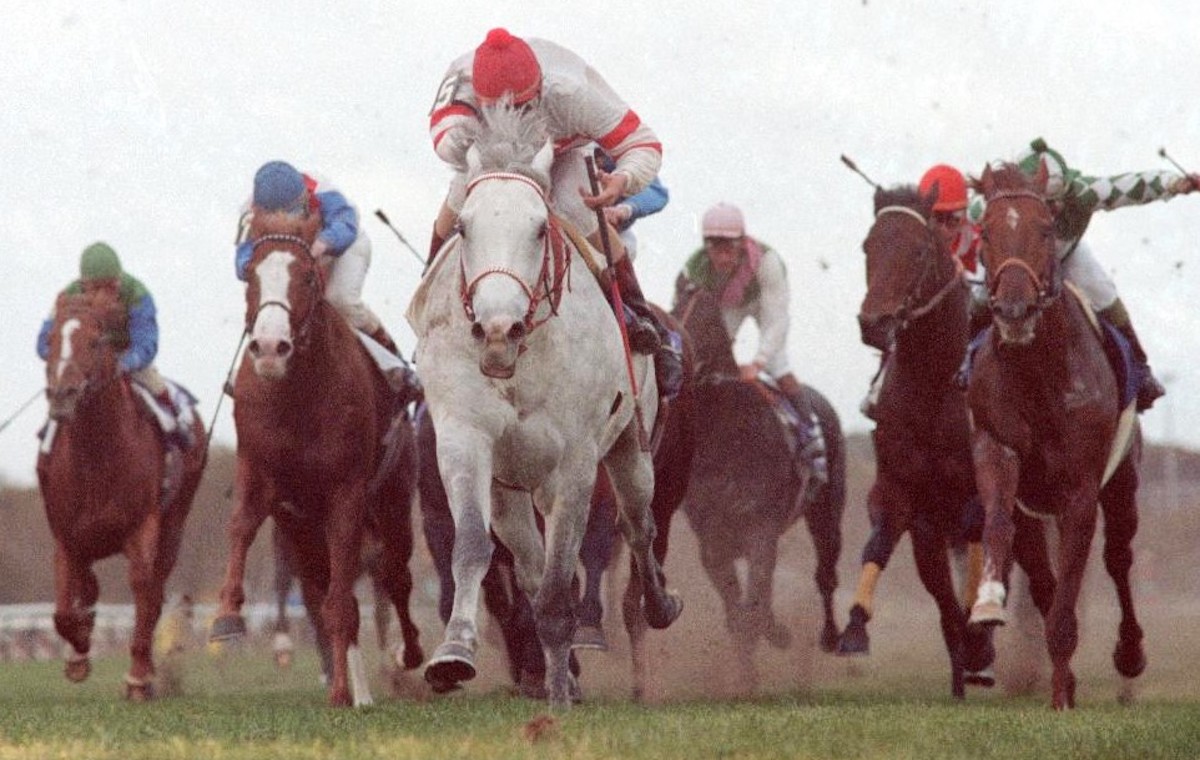 After a bid of $24,000 failed to make her reserve, Illiterate sold privately to the Pennsylvania-based Southeast Stables led by Roy S. Lerman, as breeder awards for products of the Keystone State began to flourish.
After a bid of $24,000 failed to make her reserve, Illiterate sold privately to the Pennsylvania-based Southeast Stables led by Roy S. Lerman, as breeder awards for products of the Keystone State began to flourish.
Historical twist
In a neat historical twist, in 1990 Southeast bred Illiterate to Kentucky-based Cozzene, who was trained by Jan Nerud to win the 1985 Breeders’ Cup Mile for owner John Nerud.
By the early 1990s, Cozzene had sired million-dollar earners Star Of Cozzene and Cozzene’s Prince, Eclipse Stakes winner Environment Friend in Britain, and Cocoboy, a half-brother to Illiterate, who made the last of his unthinkable 196 starts for a $4,500 claiming tag in Puerto Rico.
By the time of Cozzene’s death in 2008, when he was mercifully euthanized while suffering the effects of melanoma, the near-white stallion also was represented by major stakes winners Running Stag, Tikkanen, Maxene, Star Over The Bay, and Mizzen Mast.
After visiting Kentucky, Illiterate was returned to Pennsylvania to foal her Cozzene colt on March 31, 1991. She was 19.
As a yearling, the colt was offered Keeneland but was taken home at $28,000 when his reserve price was not attained. Even so, Lerman figured the Cozzene colt had the potential to sell well as a two-year-old and plotted a course that led to the Fasig-Tipton Mid-Atlantic sale of 1993, but a bid $29,000 once again failed to meet the reserve.
Enter Georgia Ridder, the undisputed First Lady of California racing who, with her late husband B.J. ‘Ben’ Ridder of the publishing dynasty, raced such outstanding runners as Flying Paster, Cascapedia, and Modus Vivendi.
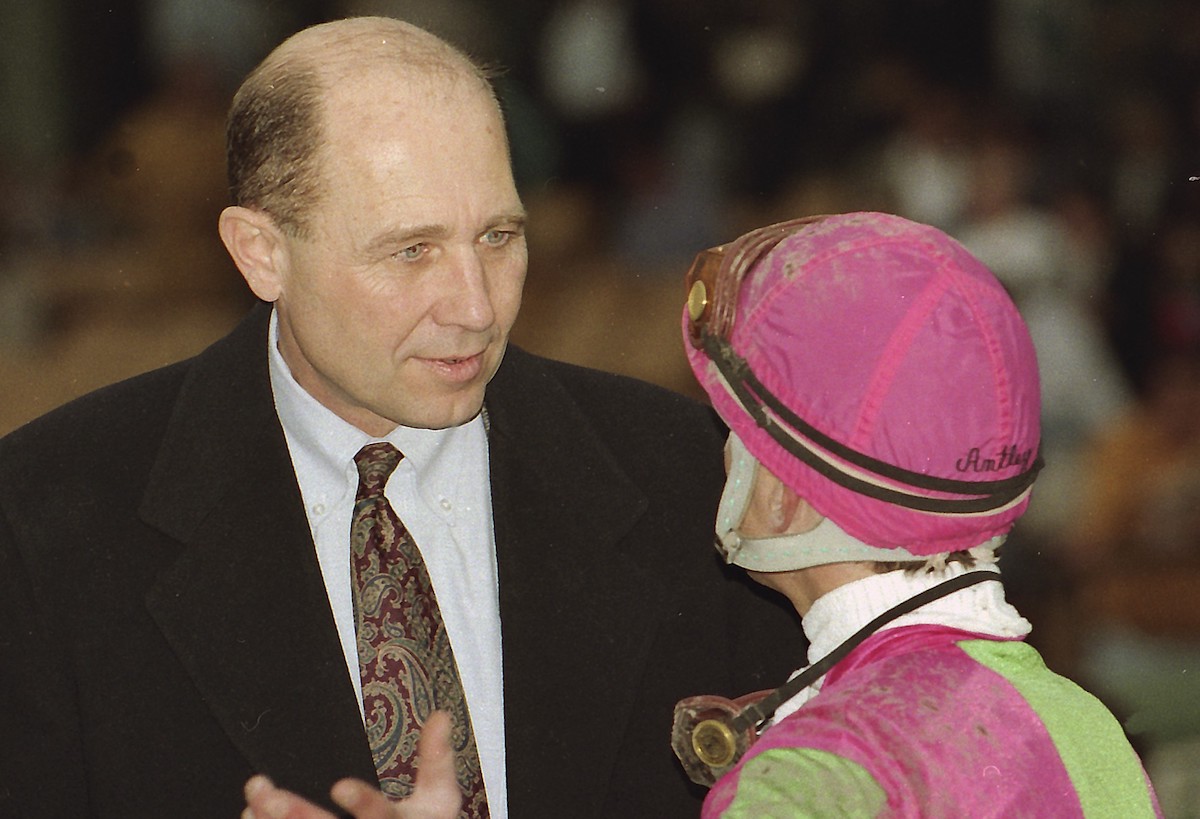 Ridder’s trainer, David Hofmans, learned through agents there was a two-horse package available from the reputable Lerman, with a Capote filly seemingly preferred over the Cozzene colt. The deal was made, Ridder deployed her mischievous side to name her new colt, then sat back to let her trainer do his thing.
Ridder’s trainer, David Hofmans, learned through agents there was a two-horse package available from the reputable Lerman, with a Capote filly seemingly preferred over the Cozzene colt. The deal was made, Ridder deployed her mischievous side to name her new colt, then sat back to let her trainer do his thing.
Widely respected
Hofmans was a widely respected horseman whose death in July of 2024 by apparent suicide cast a pall over the California racing community.
‘Sincerity was his middle name’ – Bill Christine remembers the late David Hofmans
Beyond Alphabet Soup, Hofmans won major races on both coasts with Touch Gold, Cat’s Cradle, Adoration, Dramatic Gold, Desert Code, Awesome Again, Balance, and Millennium Wind, while taking down such prizes as the Belmont Stakes, Santa Anita Handicap, Queen’s Plate, Blue Grass Stakes, Haskell Invitational, Hollywood Futurity, and three Breeders’ Cup events.
“At first, Alphabet Soup was at Hollywood Park with my dad,” said Grant Hofmans, who was his father’s top assistant at the time.
“With him, it was one step forward, two or three back. He’d get going, a knee would blow up, and he’d need a couple weeks off. He’d get going again and something else would happen. Dad finally said he was going to send this little horse over to me at Santa Anita.”
At the time, the Hofmans stable was a going concern, with full barns at Hollywood and Santa Anita.
“At one point he even looked like he had tendonitis,” Hofmans said. “We babied him along and kept jogging him through it. I think he was getting hold of the Santa Anita surface better than Hollywood, because he was kind of a post-legged horse behind, straight up and down. He would lock his stifles and walk out of his stall dragging his hind legs.”
Hofmans, who currently works for the Taylor Made Farm organization in Kentucky, found that the young Alphabet Soup benefited from wedges in his hind shoes.
“We changed that angle just a little, and he never locked his stifles again,” Hofmans said.
After those stops and starts, Alphabet Soup finally made his debut on April 2, 1994, going a mile on the dirt at Santa Anita. He finished third. On May 11, one week after his more precocious contemporaries ran in the 120th Kentucky Derby, Alphabet Soup broke his maiden going seven furlongs at Hollywood Park.
Stout and strong
“He started out as a slight horse, and he was never tall, but as he aged he really got stout and strong,” Hofmans said. “Once he got going, he never really looked back.”
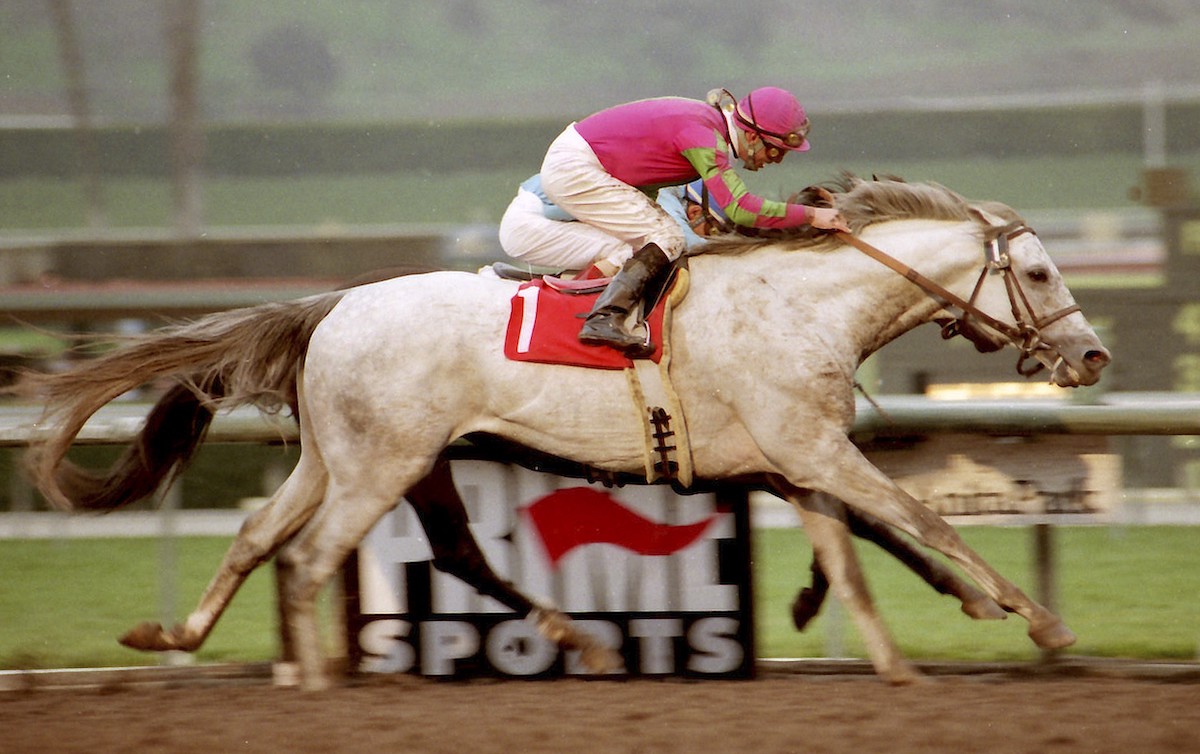 Alphabet Soup was passed around among jockeys Corey Black, Gary Stevens, and Chris Antley. Chris McCarron joined the queue in late summer of 1994 to win back-to-back allowance races at Del Mar and Santa Anita.
Alphabet Soup was passed around among jockeys Corey Black, Gary Stevens, and Chris Antley. Chris McCarron joined the queue in late summer of 1994 to win back-to-back allowance races at Del Mar and Santa Anita.
When Alphabet Soup made his stakes debut in the Volante Handicap, McCarron was committed elsewhere so Antley climbed back aboard and nearly turned the trick, beaten only a head at the end of nine furlongs on the grass. It was the third and last time Alphabet Soup ever touched the stuff.
“By Cozzene, so of course we had to try him on the turf,” Hofmans said. “He was a little-footed horse, though, who was meant for the dirt.
Alphabet Soup was also honest to a fault. When he was right, he ran his heart out, win or lose. When something was wrong – evidenced by a listless fifth in the Lazaro Barrera Stakes at the end of 1994 – his people took it seriously and backed off.
By July 1995, Alphabet Soup was ready to return. Eddie Delahoussaye stepped in for an unavailable McCarron in an allowance race win, then Chris was back in the saddle to celebrate Alphabet Soup’s back-to-back scores in Del Mar’s Harry Brubaker and Budweiser Breeders’ Cup Handicaps.
Late bloomer
During the mid-1990s, the ranks of older main track horses in California was among the deepest in recent history. By early autumn of ’95, David Hofmans was ready to throw his late bloomer into the deep end of the pool.
First, his horse finished a good third in the Goodwood Handicap at Santa Anita to Soul Of The Matter, who would later give Cigar the race of his life in the first Dubai World Cup, and Tinners Way, already a two-time winner of the Pacific Classic.
Next, Alphabet Soup went on the road to Churchill Downs, where he was favored to win the Clark Handicap on Thanksgiving Day but had to settle for third to the local runner Judge T C, a proven G2 commodity.
Still, the gray horse was holding his form and his weight, which encouraged Hofmans to come right back one month later in the Native Diver Handicap at Hollywood Park. With Antley aboard, Alphabet Soup won by 7½ lengths.
Hofmans was a native Los Angeleno and Ridder had been a doyen of the arts and social Pasadena scene since moving there with her husband in the mid-1950s. As such, there was no race they wanted to win more than the Santa Anita Handicap, the West’s oldest and most prestigious event, which meant that everything Alphabet Soup did at the dawn of his five-year-old campaign was preordained.
First came the San Pasqual Handicap of Jan. 15, 1996, in which Alphabet Soup was caught in a three-way speed fest before pulling away to win by nearly two lengths at the end of 8½ furlongs. Just 19 days later, he faced a fresh group in the nine-furlong San Antonio and prevailed again, this by a neck over Soul of the Matter, who was favored.
“That was a real dogfight down the lane,” Hofmans said. “I still have goosebumps thinking about it.”
So the table was set. Alphabet Soup was among a dozen entered for the million-dollar Santa Anita Handicap, run on the first Saturday in March.
For some reason, the Strub Stakes winner Helmsman was favored over the Hofmans runner, as was the accomplished Afternoon Deelites, owned by Burt Bacharach. (Soul Of The Matter, also owned by the composer, was being pointed for the inaugural Dubai World Cup later that month.)
Defending champ Urgent Request and the sprinter Score Quick set a bristling pace that seemed made to order for Alphabet Soup’s style. And yet, halfway through the mile-and-a-quarter race Antley found himself asking his horse to keep up, to no avail. Alphabet Soup beat one horse, and was soon after diagnosed with an aggravated ankle.
Breathing fire
After nine races in eight months, Alphabet Soup was given time to recharge at Ridder’s Hidden Springs Ranch in Mountain High, California (elevation, 4,500 feet).
He came back breathing fire with a victory in the seven-furlong Pat O’Brien Handicap at Del Mar and a near miss to his younger stablemate Dramatic Gold in the Del Mar Breeders’ Cup Handicap at one mile.
Hofmans was hardly discouraged, and when the racing caravan move back north, his horse was primed for the Goodwood Handicap at Santa Anita on Oct. 5.
The date has lived in infamy. Reunited with Chris McCarron, Alphabet Soup won easily that day, dismissing three rivals with authority.
There was, however, an incident approaching the first turn of the nine furlongs in which Dare And Go, racing to the inside, briefly checked while in tight quarters. In their wisdom, the stewards decided Alphabet Soup was to blame for applying pressure from the outside. He was disqualified to third place, behind Dare And Go.
“The place went crazy,” Grant Hofmans recalled. “People were yelling at the stewards, throwing chairs. I don’t think we’d ever seen that kind of call.”
It was unusual, applied to an incident so early in a middle-distance race, and the Alphabet Soup camp was rightfully chagrined. Still, there was consolation provided by the performance of their star, who seemed to be peaking at just the right time for the biggest challenge of his life.
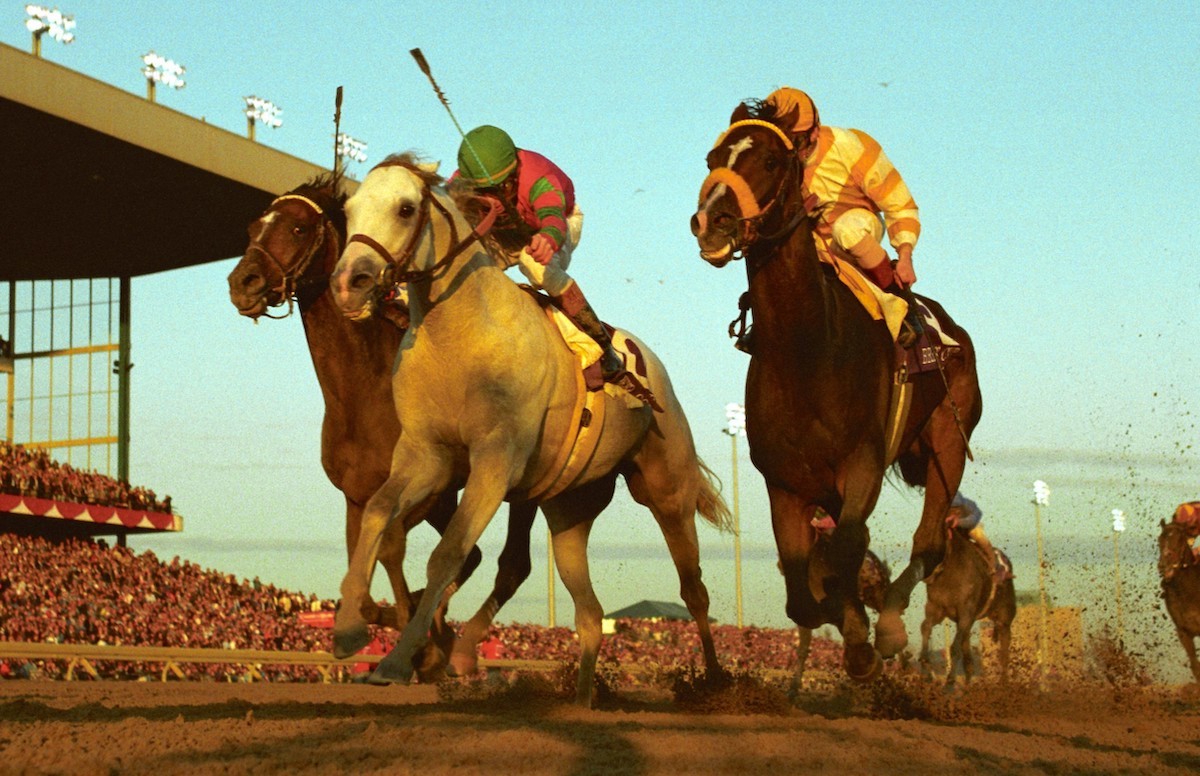 In 1996, for the first time the Breeders’ Cup was leaving the United States, destined for Toronto’s Woodbine Racetrack in the Canadian province of Ontario, on Oct. 26.
In 1996, for the first time the Breeders’ Cup was leaving the United States, destined for Toronto’s Woodbine Racetrack in the Canadian province of Ontario, on Oct. 26.
Cigar would be there for the Classic, making what figured to be the final start of his career, along with a collection of accomplished three-year-olds that included the winners of the Belmont, the Preakness, and the Travers Stakes.
The elder Hofmans was not shy about the prospects of his horse, but few could hear the trainer above the din surrounding the swan song of Cigar. Still, that hardly explains how seven of the 13 runners in the Classic went off at shorter odds than Alphabet Soup’s 19-1. Hofmans chose not to take it personally.
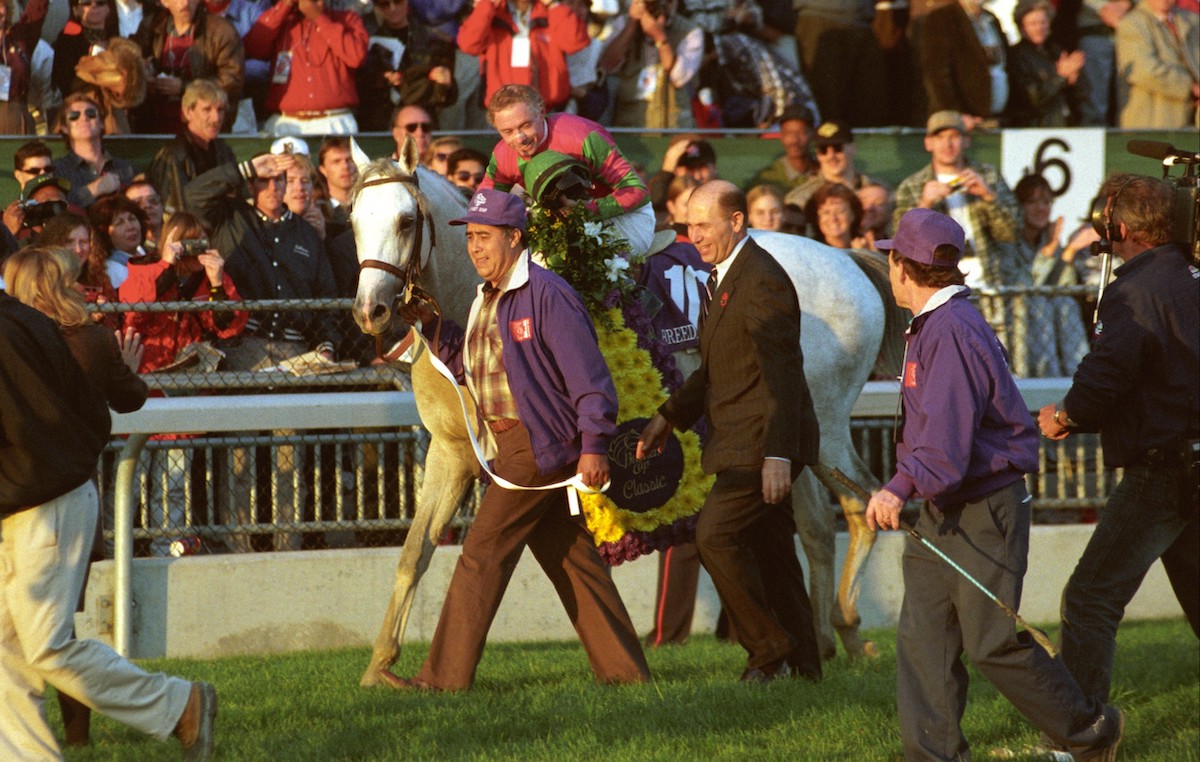 “I just want to see him within a length of someone somewhere late,” Hofmans said as he left the paddock that day before the Classic. “Because this little horse will absolutely lay his body down.”
“I just want to see him within a length of someone somewhere late,” Hofmans said as he left the paddock that day before the Classic. “Because this little horse will absolutely lay his body down.”
Blanket finish
And that he did, coming out on top of a four-horse blanket finish by a nose over Preakness winner Louis Quatorze, with Cigar a head behind and just in front of local hero Mt. Sassafras, down on the rail.
Grant Hofmans was back in California, taking care of business for their large public stable and watching on a small TV screen in the Santa Anita box seat section.
“After his last breeze before the Breeders’ Cup, my dad was very high on him,” Hofmans said. “And he won in typical Alphabet Soup style. You could almost see it in his eye, winning by just enough to get the job done.”
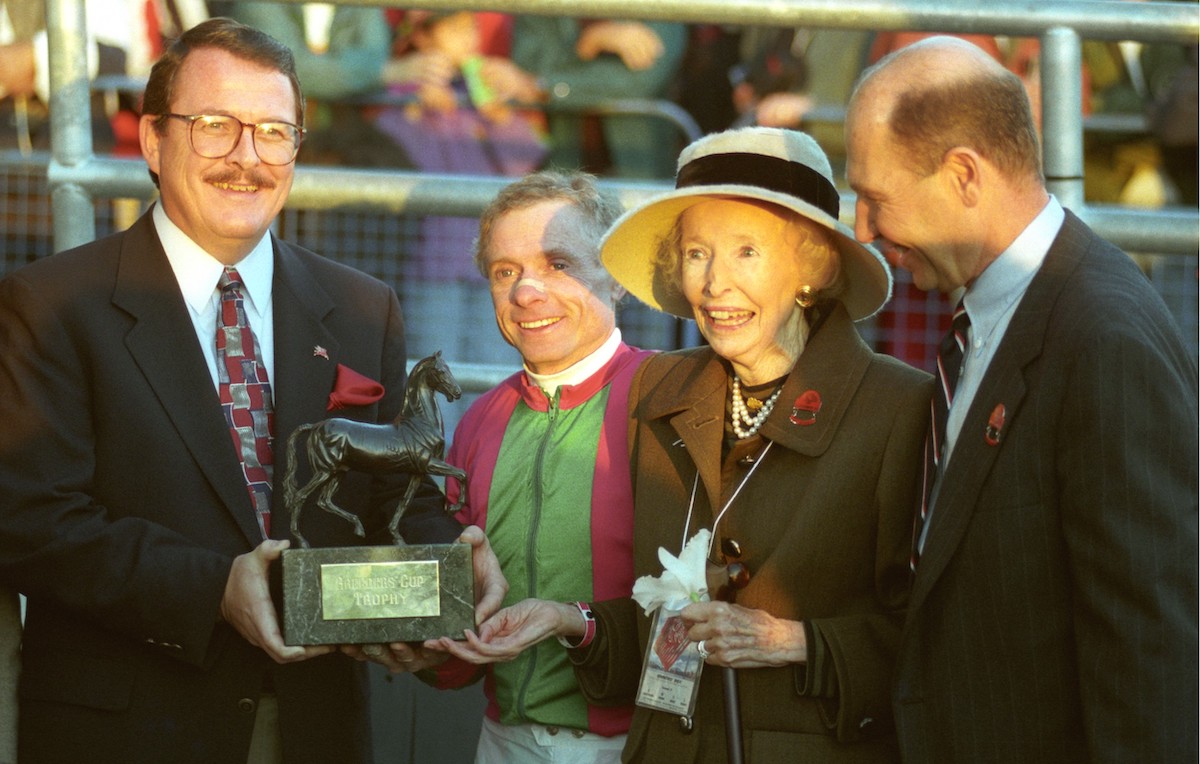 That year, Alphabet Soup was a finalist for an Eclipse Award as Outstanding Older Male. The fact that he finished second in the balloting to Cigar was hardly an embarrassment, and, after all, Alphabet Soup did have the last word of the season.
That year, Alphabet Soup was a finalist for an Eclipse Award as Outstanding Older Male. The fact that he finished second in the balloting to Cigar was hardly an embarrassment, and, after all, Alphabet Soup did have the last word of the season.
He commenced his five-year-old campaign in early 1997 with a good second to the established older star Gentlemen in the San Antonio Handicap.
However, he emerged from the race with an ankle problem that refused to heal sufficiently. His retirement was announced, along with a stallion deal that sent him to the Adena Farm of Frank Stronach in Kentucky.
Alphabet Soup’s offspring include Golden Shaheen winner Our First Recruit, Matriarch Stakes winner Egg Drop, La Brea Stakes winner Alphabet Kisses, Del Mar Handicap winner Leprechaun Kid, and a host of other graded stakes winners that included Watchem Smokey, Alpha Bettor, M B Sea, and Mark One. More than three dozen of his sons and daughters earned in excess of a quarter-million dollars.
At various times, Alphabet Soup stood in Canada and New York, before returning to Adena and then on to retirement at Old Friends in 2015.
Popular senior
“We were so thrilled to have him,” said Michael Blowen, who created Old Friends Equine of Georgetown, Kentucky. “He was one of our most popular seniors, the kindest horse, and so approachable. But his time with us was not without drama.”
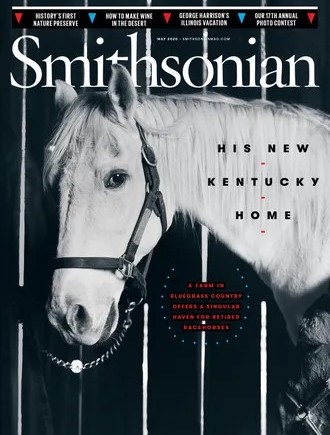 On a cold January morning in 2016, a fire broke out in the small barn holding Alphabet Soup and two other horses. He had been there only a few months, but the newcomer reacted as if it was just another interesting day at the farm.
On a cold January morning in 2016, a fire broke out in the small barn holding Alphabet Soup and two other horses. He had been there only a few months, but the newcomer reacted as if it was just another interesting day at the farm.
“We couldn't take them too far away, so we put Alphabet Soup in a round pen right there by the barn and gave him some hay,” Blowen said.
“There were fire trucks going around, people scurrying everywhere, and at some point the car of our farm manager Tim Wilson caught fire. When the air bags blew up, I looked over at Alphabet Soup. He never lifted his head from the hay.”
The old stallion struck up an inseparable friendship with a farm donkey named Gorgeous George. Alphabet Soup gained another round of national recognition as the cover boy on an issue of Smithsonian Magazine.
He fought off a siege of the same melanoma that led to the death of his sire, and he still was doing well when kidney disease finally got his number, in early 2022.
Dr. Ashton Broman has been among the cadre of local veterinarians who volunteered their services to the horses of Old Friends.
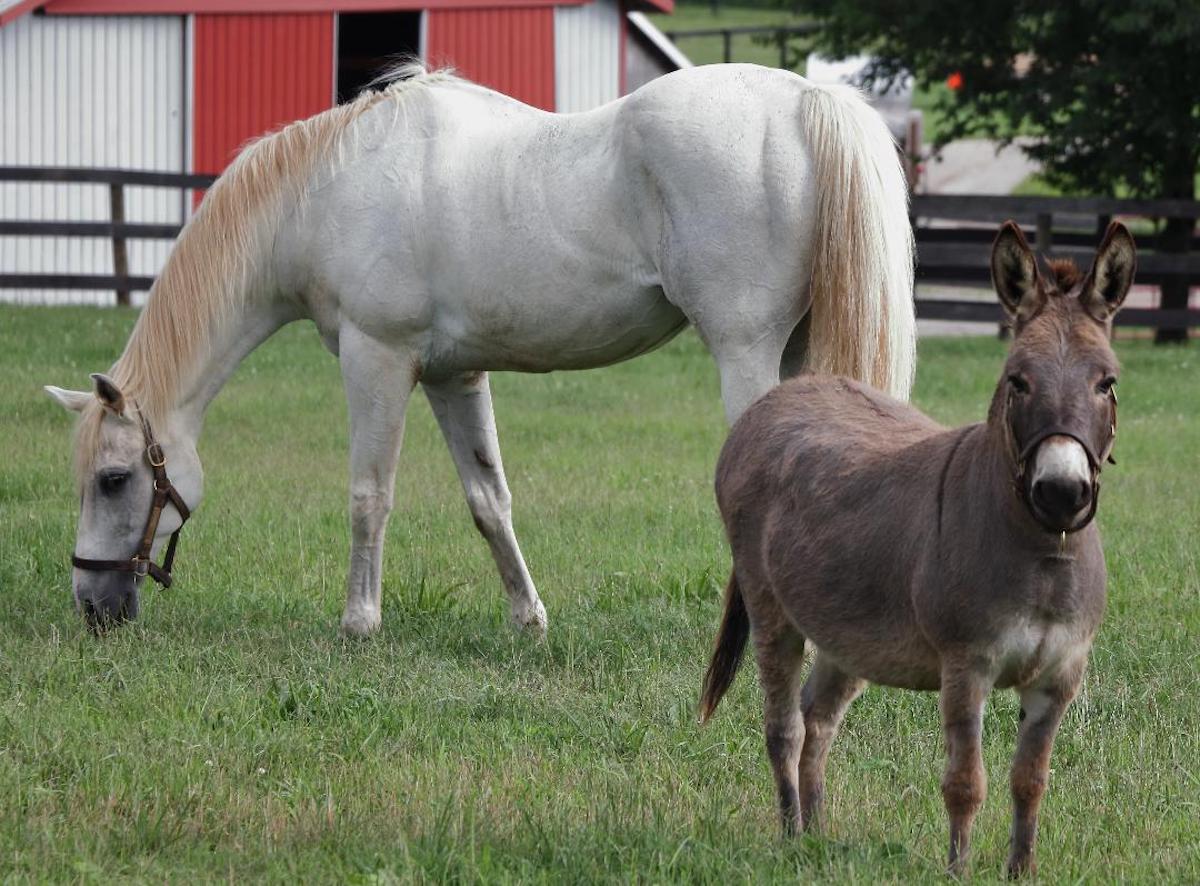 “Alphabet Soup was actually one of my favorites,” Broman said. “I had just treated him recently for a sinus infection, and he was one of my first patients out there.
“Alphabet Soup was actually one of my favorites,” Broman said. “I had just treated him recently for a sinus infection, and he was one of my first patients out there.
“I did perform his euthanasia,” Broman added. “It's never easy, and it never should be easy. It’s the hardest part of the job, but it’s also an honor to help them pass gently without suffering.”
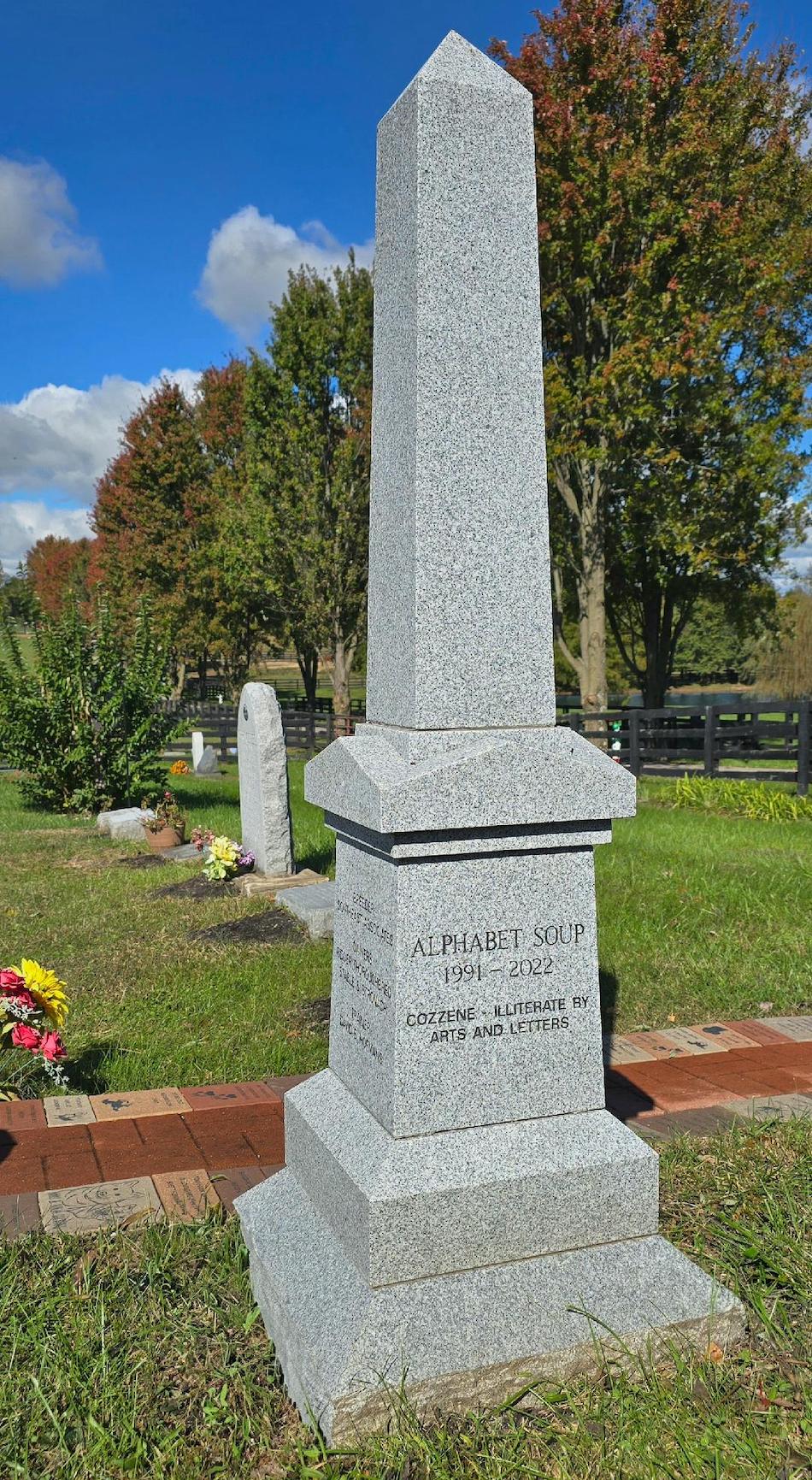 At 31, Alphabet Soup was at the time the oldest Old Friends resident. His dam, Illiterate, also was 31 when she died in 2005. He was eulogized in no less than The New Yorker magazine by Susan Orlean as “one of those cheerful, upbeat kinds of horses, always in a good mood, never of the mind to bite you or kick you or crush you against the side of his stall.”
At 31, Alphabet Soup was at the time the oldest Old Friends resident. His dam, Illiterate, also was 31 when she died in 2005. He was eulogized in no less than The New Yorker magazine by Susan Orlean as “one of those cheerful, upbeat kinds of horses, always in a good mood, never of the mind to bite you or kick you or crush you against the side of his stall.”
His remains were interred in the Old Friends cemetery beneath a tall, granite column. “We designed it to look like the Washington Monument,” Blowen said.
Fitting, for a horse who never told a lie.
• Read all Jay Hovdey's features in his Favorite Racehorses series
Jerry Bailey: I’d like to see a national commissioner for US racing – with some teeth
View the latest TRC Global Rankings for horses / jockeys / trainers / sires


